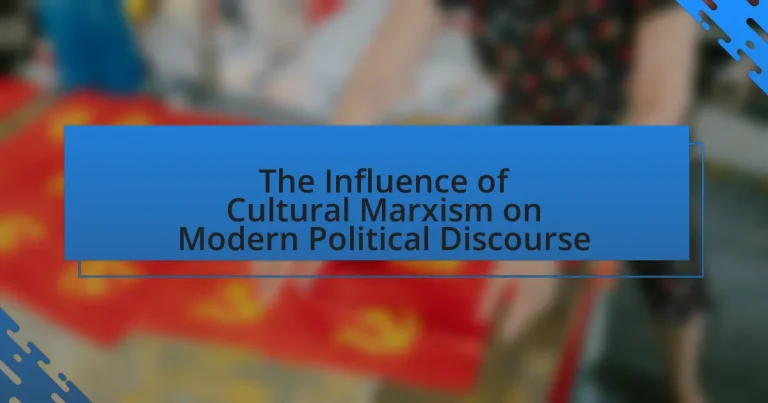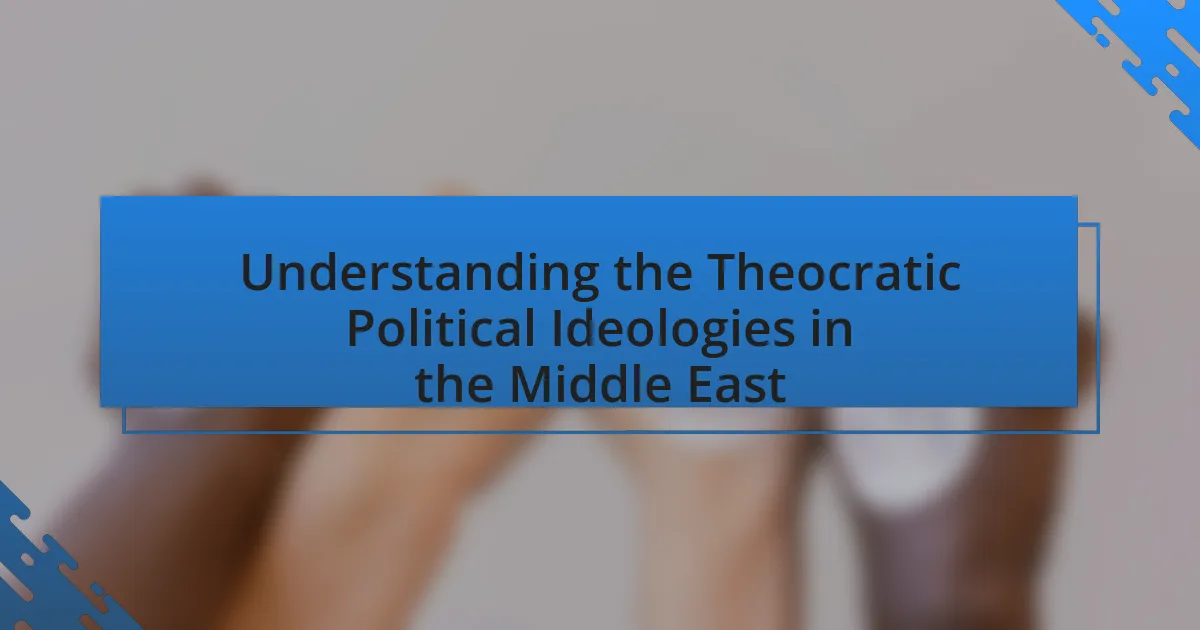Cultural Marxism is a theoretical framework that critiques societal culture through a Marxist lens, emphasizing the role of culture in perpetuating social inequalities. Originating from the Frankfurt School in the early 20th century, it highlights the influence of cultural institutions on power dynamics and oppression, expanding traditional Marxist analysis beyond economic factors. The article explores the emergence of Cultural Marxism, its key thinkers, core principles, and its significant impact on modern political discourse, including identity politics, social justice movements, and public policy. It also addresses the contentious nature of Cultural Marxism in political debates and its implications for society today, particularly in shaping media narratives and educational frameworks.
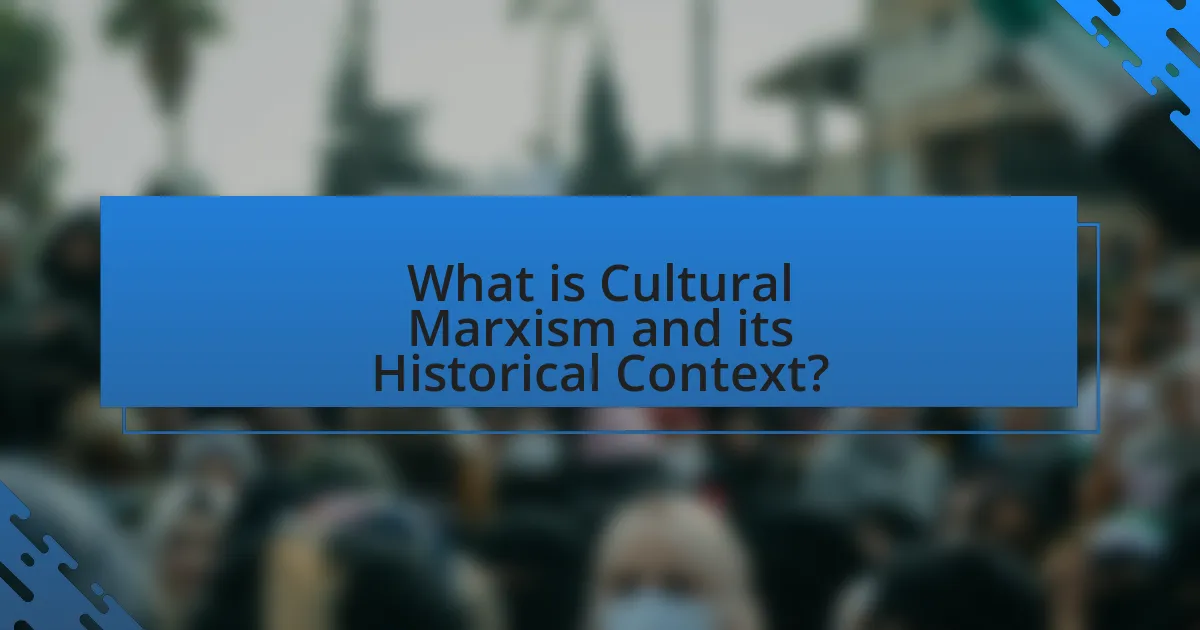
What is Cultural Marxism and its Historical Context?
Cultural Marxism refers to a theoretical framework that critiques the cultural aspects of society through a Marxist lens, emphasizing the role of culture in perpetuating social inequalities. It emerged from the Frankfurt School in the early 20th century, where scholars like Theodor Adorno and Max Horkheimer analyzed how culture, ideology, and mass media contribute to the maintenance of capitalist societies. This perspective argues that traditional Marxist analysis focused too heavily on economic factors, neglecting the influence of culture on social dynamics. The historical context includes the rise of post-World War II intellectual movements that sought to address issues of identity, race, and gender, leading to the development of critical theory, which further shaped contemporary discussions around power and oppression in modern political discourse.
How did Cultural Marxism emerge as a concept?
Cultural Marxism emerged as a concept in the early 20th century, primarily through the work of the Frankfurt School, a group of Marxist theorists who sought to adapt Marxist theory to contemporary cultural and social issues. The Frankfurt School, founded in 1923 in Germany, included influential thinkers such as Theodor Adorno, Max Horkheimer, and Herbert Marcuse, who argued that traditional Marxism focused too heavily on economic factors and neglected the role of culture in shaping society. They posited that culture, ideology, and social institutions could perpetuate oppression and inequality, thus necessitating a broader analysis that included cultural dimensions. This perspective gained traction in the post-World War II era, influencing various social movements and academic disciplines, and has since been a point of contention in political discourse, particularly in debates surrounding identity politics and social justice.
What are the key historical events that shaped Cultural Marxism?
Key historical events that shaped Cultural Marxism include the Frankfurt School’s establishment in the 1920s, which aimed to adapt Marxist theory to cultural analysis, and the rise of post-World War II social movements that emphasized identity politics. The Frankfurt School, particularly figures like Theodor Adorno and Max Horkheimer, critiqued traditional Marxism’s focus on economic class and introduced concepts like the culture industry, which argued that mass media and culture serve to perpetuate capitalist ideologies. Additionally, the 1960s counterculture and civil rights movements further propelled Cultural Marxism by advocating for social justice, gender equality, and anti-colonialism, thereby expanding Marxist thought beyond economic factors to include cultural and social dimensions. These events collectively influenced contemporary political discourse by integrating Marxist critiques into discussions on race, gender, and identity.
Who are the prominent thinkers associated with Cultural Marxism?
Prominent thinkers associated with Cultural Marxism include Theodor Adorno, Max Horkheimer, Herbert Marcuse, and Antonio Gramsci. These scholars were influential in developing the Frankfurt School’s critical theory, which critiques culture and society through a Marxist lens. Adorno and Horkheimer’s work, particularly in “Dialectic of Enlightenment,” explores the relationship between culture and power, while Marcuse’s “One-Dimensional Man” critiques consumer society. Gramsci’s concept of cultural hegemony further informs the understanding of how cultural institutions perpetuate power dynamics.
What are the core principles of Cultural Marxism?
Cultural Marxism is primarily characterized by its focus on the critique of culture and ideology, emphasizing the role of cultural institutions in perpetuating social inequalities. Its core principles include the belief that societal structures, such as family, education, and media, are instrumental in maintaining power dynamics and oppression. Additionally, Cultural Marxism advocates for the deconstruction of traditional values and norms to promote social justice and equality, often through identity politics. This framework draws from the ideas of early Marxist theorists who expanded the analysis of class struggle to include cultural and ideological dimensions, asserting that cultural hegemony must be challenged to achieve true liberation.
How does Cultural Marxism differ from traditional Marxism?
Cultural Marxism differs from traditional Marxism primarily in its focus on cultural rather than economic factors as the basis for societal change. Traditional Marxism emphasizes class struggle and economic inequality as the driving forces behind social transformation, advocating for the overthrow of capitalist systems to achieve a classless society. In contrast, Cultural Marxism seeks to address issues of identity, race, gender, and cultural hegemony, arguing that these elements are crucial in understanding power dynamics and social injustices. This shift in focus reflects a broader interpretation of Marxist theory, which incorporates elements of critical theory and postmodernism, emphasizing the role of culture in shaping human experience and societal structures.
What role does identity politics play in Cultural Marxism?
Identity politics serves as a fundamental component of Cultural Marxism by emphasizing group identity over individualism, which aims to address systemic inequalities based on race, gender, and sexuality. This focus on identity allows Cultural Marxism to critique traditional power structures and advocate for marginalized groups, thereby reshaping political discourse. For instance, scholars like Herbert Marcuse and Angela Davis have argued that recognizing and addressing the specific grievances of these groups is essential for achieving social justice. This approach has led to the proliferation of movements that seek to dismantle perceived oppressive systems, illustrating how identity politics is integral to the broader objectives of Cultural Marxism in contemporary society.
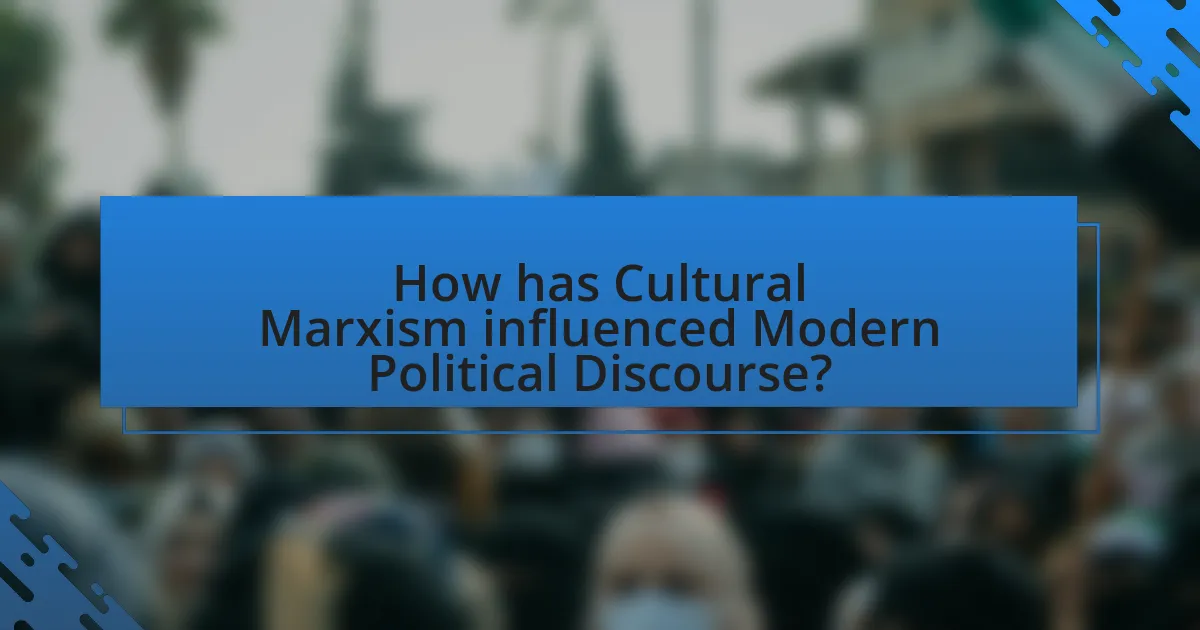
How has Cultural Marxism influenced Modern Political Discourse?
Cultural Marxism has significantly influenced modern political discourse by promoting ideas of social justice, identity politics, and critical theory. These concepts challenge traditional power structures and advocate for the rights of marginalized groups, reshaping discussions around race, gender, and class. For instance, the rise of movements such as Black Lives Matter and rights can be traced back to the principles rooted in Cultural Marxism, which emphasize the importance of intersectionality and systemic oppression. This influence is evident in academic institutions and media, where narratives often focus on deconstructing societal norms and advocating for equity, reflecting the foundational tenets of Cultural Marxism in contemporary debates.
What are the main areas of political discourse affected by Cultural Marxism?
The main areas of political discourse affected by Cultural Marxism include identity politics, social justice movements, and critiques of capitalism. Identity politics emphasizes the experiences and perspectives of marginalized groups, shaping discussions around race, gender, and sexuality. Social justice movements advocate for systemic change to address inequalities, often drawing on Cultural Marxist theories to critique existing power structures. Additionally, critiques of capitalism challenge traditional economic frameworks, promoting alternative models that prioritize social equity over profit. These areas reflect the broader influence of Cultural Marxism on contemporary political debates and policies.
How does Cultural Marxism impact discussions on social justice?
Cultural Marxism significantly influences discussions on social justice by framing social issues through a lens of power dynamics and systemic oppression. This perspective emphasizes the role of cultural institutions in perpetuating inequalities, leading to a focus on identity politics and intersectionality. For instance, proponents argue that traditional social structures, such as family and religion, contribute to marginalization, thus advocating for reforms that challenge these norms. This approach has been evident in movements advocating for racial, gender, and sexual equality, where the emphasis on collective identity and historical context shapes policy discussions and activism. The impact is reflected in academic discourse, where scholars like Herbert Marcuse and Theodor Adorno have critiqued capitalist societies, arguing for a transformative approach to social justice that addresses cultural as well as economic factors.
What influence does Cultural Marxism have on education and academia?
Cultural Marxism influences education and academia by promoting critical theories that challenge traditional values and structures. This ideological framework encourages the examination of power dynamics related to race, gender, and class, often leading to a curriculum that emphasizes social justice and identity politics. For instance, the incorporation of critical race theory in educational settings has sparked debates about systemic racism and privilege, reshaping discussions in classrooms and academic research. Additionally, the prevalence of leftist ideologies in faculty hiring practices and academic publications has resulted in a homogenization of thought, where dissenting viewpoints may be marginalized. This shift has been documented in studies such as “The Academic Left: A Study of the Political Orientation of Faculty” by the National Association of Scholars, which highlights the ideological imbalance in higher education.
Why is Cultural Marxism a contentious topic in political debates?
Cultural Marxism is a contentious topic in political debates because it is perceived as a framework that critiques traditional values and institutions, often leading to polarized opinions. Proponents argue that it addresses social inequalities and promotes inclusivity, while critics claim it undermines Western cultural foundations and promotes divisive identity politics. This division is evident in various political movements and discussions, where terms associated with Cultural Marxism are used to rally support or opposition, reflecting broader ideological battles over social change and cultural identity.
What arguments do critics of Cultural Marxism present?
Critics of Cultural Marxism argue that it promotes divisive identity politics, undermines traditional values, and fosters a culture of victimhood. They contend that this ideological framework prioritizes group identity over individual merit, leading to social fragmentation. Additionally, critics assert that Cultural Marxism seeks to dismantle established institutions, such as family and religion, which they believe are essential for societal stability. They often cite examples from academia and media, where they perceive a bias against conservative viewpoints, suggesting that this reflects a broader agenda to reshape cultural norms in favor of leftist ideologies.
How do proponents of Cultural Marxism defend their views?
Proponents of Cultural Marxism defend their views by arguing that societal structures and cultural norms perpetuate inequality and oppression. They assert that traditional power dynamics, particularly those related to race, gender, and class, must be critically examined and challenged to achieve social justice. For instance, they often reference historical movements that have successfully addressed systemic injustices, such as the civil rights movement, to illustrate the necessity of cultural critique in fostering societal change. Additionally, they emphasize the importance of intersectionality, which highlights how various forms of discrimination overlap, thereby necessitating a comprehensive approach to social reform. This framework is supported by academic research, such as the works of scholars like Herbert Marcuse and Antonio Gramsci, who argue for the need to transform cultural institutions to promote equity and inclusivity.
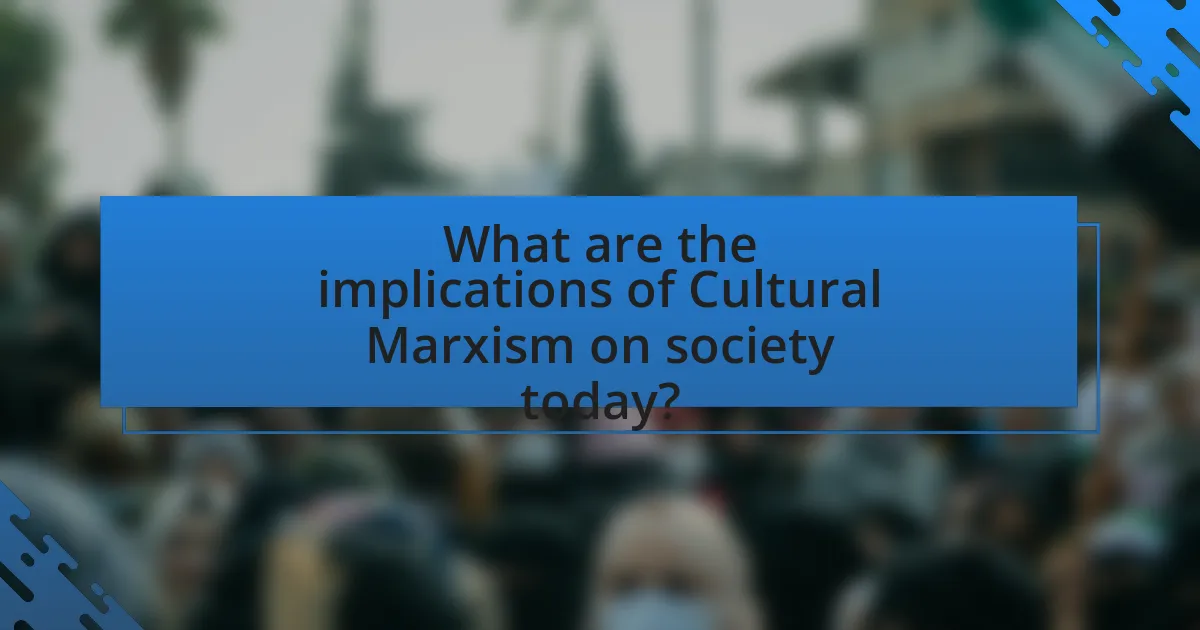
What are the implications of Cultural Marxism on society today?
Cultural Marxism has significant implications on society today, primarily influencing social justice movements and identity politics. This ideological framework promotes the idea that societal structures are shaped by power dynamics related to race, gender, and class, leading to increased polarization and conflict over these issues. For instance, the rise of movements advocating for racial equality and gender rights can be traced back to Cultural Marxist thought, which critiques traditional power hierarchies. Additionally, the emphasis on political correctness and the re-evaluation of historical narratives reflect Cultural Marxism’s impact on education and public discourse, often resulting in backlash from those who perceive it as a threat to free speech. These dynamics illustrate how Cultural Marxism shapes contemporary societal debates and influences policy-making, highlighting its pervasive role in modern political discourse.
How does Cultural Marxism shape public policy and legislation?
Cultural Marxism shapes public policy and legislation by promoting social justice, identity politics, and progressive values that influence governmental priorities and legal frameworks. This ideological framework encourages policies that address systemic inequalities related to race, gender, and sexuality, leading to legislation such as affirmative action, anti-discrimination laws, and educational reforms that emphasize diversity and inclusion. For instance, the implementation of Title IX in the United States, which prohibits sex-based discrimination in federally funded education programs, reflects the influence of Cultural Marxist principles in shaping educational policy. Additionally, the rise of movements advocating for rights has resulted in significant legal changes, such as the legalization of same-sex marriage, demonstrating how Cultural Marxism informs legislative agendas aimed at promoting equity and social change.
What examples illustrate the impact of Cultural Marxism on recent laws?
Cultural Marxism has influenced recent laws primarily through the promotion of social justice initiatives and anti-discrimination legislation. For instance, the implementation of laws such as the Equality Act in the United States aims to expand protections against discrimination based on sexual orientation and gender identity, reflecting Cultural Marxist principles of equity and inclusion. Additionally, various countries have enacted hate speech laws that criminalize speech deemed offensive to marginalized groups, aligning with the Cultural Marxist focus on protecting identity and promoting social cohesion. These legislative changes illustrate the tangible effects of Cultural Marxism on contemporary legal frameworks, as they seek to reshape societal norms and values around issues of identity and equality.
How does Cultural Marxism influence media representation and narratives?
Cultural Marxism influences media representation and narratives by promoting ideologies that emphasize social justice, identity politics, and the critique of traditional power structures. This framework encourages media outlets to focus on marginalized groups and systemic inequalities, often reshaping narratives to align with progressive values. For instance, studies have shown that media representation increasingly highlights issues such as race, gender, and class disparities, reflecting Cultural Marxist principles. Research by the Pew Research Center indicates that audiences are more likely to engage with content that addresses social issues, demonstrating the impact of these ideologies on media consumption and production.
What are the potential future trends regarding Cultural Marxism in political discourse?
Potential future trends regarding Cultural Marxism in political discourse include an increase in polarization and the emergence of counter-movements. As Cultural Marxism continues to be a focal point in debates about identity politics and social justice, political factions may become more entrenched in their positions, leading to heightened ideological divides. This trend is supported by the rise of populist movements that often position themselves against perceived Cultural Marxist ideologies, as seen in various countries where political rhetoric has increasingly framed social issues through this lens. Additionally, the integration of Cultural Marxist critiques into mainstream political platforms may lead to more comprehensive discussions on systemic inequalities, influencing policy-making and electoral strategies.
How might Cultural Marxism evolve in response to global challenges?
Cultural Marxism may evolve by adapting its frameworks to address pressing global challenges such as climate change, economic inequality, and social justice movements. This evolution could manifest in a greater emphasis on intersectionality, where various forms of oppression are analyzed collectively, thereby broadening its appeal and relevance. For instance, the rise of environmental justice as a critical discourse aligns with Cultural Marxist principles by highlighting how marginalized communities disproportionately suffer from ecological degradation. Additionally, the increasing focus on digital activism and global connectivity may lead Cultural Marxism to leverage technology for mobilization and awareness, as seen in movements like Black Lives Matter, which utilize social media to amplify their messages. These adaptations reflect a responsiveness to contemporary issues while maintaining core tenets of Cultural Marxism, such as critiquing power structures and advocating for systemic change.
What role will technology play in the dissemination of Cultural Marxist ideas?
Technology will significantly enhance the dissemination of Cultural Marxist ideas by facilitating rapid communication and broad access to information. Digital platforms, such as social media and online forums, allow for the widespread sharing of these ideas, enabling them to reach diverse audiences quickly. For instance, studies have shown that social media algorithms can amplify content that resonates with users’ beliefs, thus promoting Cultural Marxist narratives among like-minded individuals. Additionally, the internet provides a space for the organization of movements and the mobilization of support, as seen in various social justice campaigns that align with Cultural Marxist principles. This interconnectedness and ease of access contribute to the normalization and integration of these ideas into mainstream political discourse.
What practical steps can individuals take to engage with Cultural Marxism in political discussions?
Individuals can engage with Cultural Marxism in political discussions by educating themselves on its principles and implications. This involves studying key texts and theories associated with Cultural Marxism, such as those by Antonio Gramsci and Theodor Adorno, to understand its critiques of capitalism and traditional social structures. Additionally, individuals should actively participate in discussions by presenting informed arguments that challenge or support Cultural Marxist perspectives, using examples from contemporary society to illustrate their points. Engaging in debates on social media platforms and community forums can also facilitate broader discussions, allowing individuals to share insights and counterarguments effectively. Furthermore, attending lectures or workshops on the topic can enhance understanding and provide networking opportunities with like-minded individuals.
